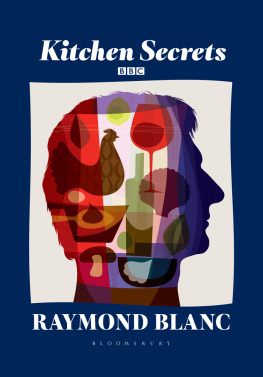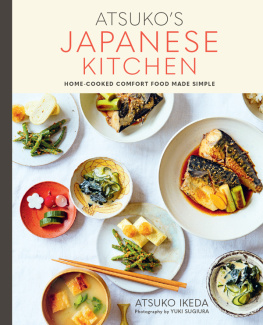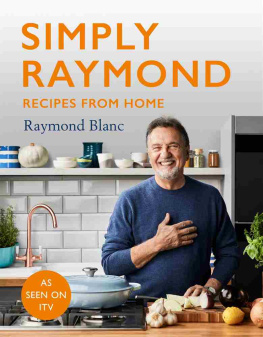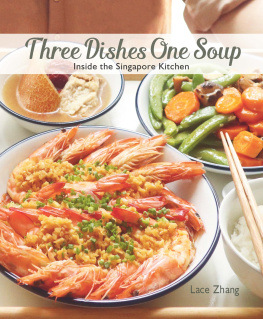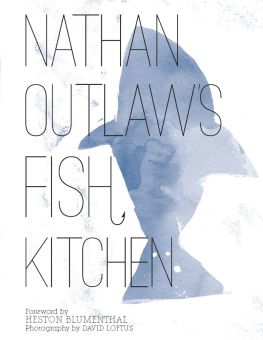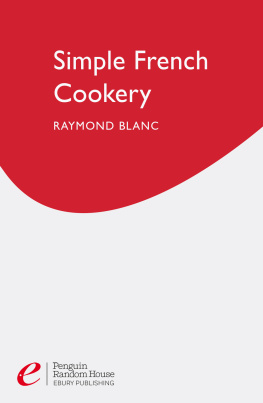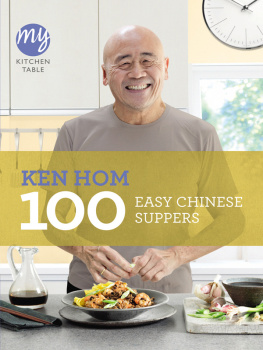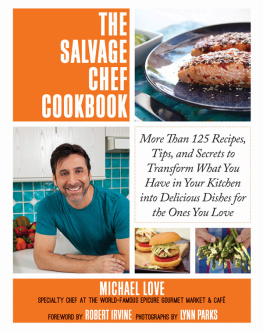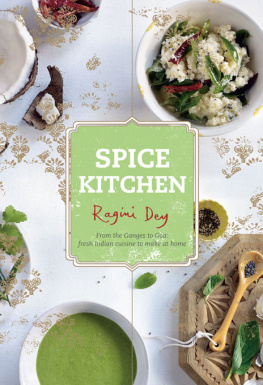

Introduction
Think for a moment of the great times you have enjoyed at the table, and more often than not they will have involved sharing. The bread is passed around from one person to another. You pour the wine for your guests, and they are kind enough to pour some more for you. The food is shared, of course, and conversation is shared. Who knows, perhaps some healthy bickering too. Those magical meals turn strangers into the dearest of friends.
This little book is also about sharing. I suppose you could say it is my way of sharing my knowledge, through wonderful recipes and hundreds of little kitchen secrets that can improve life, save time and maybe spare embarrassment.
Perhaps I am well equipped for such a task. Over the years, both in and out of the kitchen, sharing has played a crucial role. During 35 years in this exciting profession, I have been privileged to acquire knowledge and, more importantly, pass it on to hundreds of young British people. Many of them are now the nations most acclaimed chefs, while others have gone abroad to make their names and win their stars.
It was in my childhood that I first began to learn about food. My mother, who lives in France, shared her knowledge with me, and her cooking has inspired many of the dishes that are served in my restaurants. I was her kitchen helper, sent to the garden to pick tomatoes or lift some carrots, and to peel and chop in preparation for the meal.
My parents instilled in me a belief in the importance of using food that is seasonal, though its true to say that we had no choice; there wasnt a supermarket selling packaged produce shipped from far-away countries. No, our food came with each season and couldnt have been more local we ate what came from the garden, and what didnt go on to the plate immediately was pickled and jarred to eat out of season.
I really believe that we are now entering an era in which we are slowly re-connecting with our own food culture, our sense of place and traditions. Food will cease to be treated as a mere convenience or commodity. We want to know where our food comes from, how it is grown and what is in it. Food sits at the very heart of society, not on the edge of it, and it connects with every single aspect of our lives.
Cooking is actually simple. First, you need good quality and seasonal fresh ingredients. If they are local, they are seasonal; they will have a better taste, colour, texture and nutrients. In addition, local produce is abundant and therefore less expensive. So local must make sense, and by being critical and aware we have a wonderful opportunity here to re-invent our crafts, our villages and our food production.
That is your first step towards good cooking, and I hope that my culinary secrets will help you on your journey.
Among the many secrets that I will share with you in this book, the first I should tell you is that I am a self-taught chef, by which I mean that I never worked under a professional chef, not even for one minute. This has been both a blessing and a curse.
A blessing because my work was not shaped by another persons culinary philosophy. I had the freedom to investigate, to be curious, to roam and question many strict culinary rules, to bring lightness to my food and discover new techniques.
But a curse because cooking can be complex (particularly at the top end) and at times, I admit, Ive missed having a mentor. Ive had to learn through my many failures small problems and occasional disasters always trying to understand the reasons for my failure. By unravelling many of the mysteries of cooking, I gained invaluable knowledge and confidence.
When I first came to England in the early 1970s and worked as a chef at the Rose Revived in Oxfordshire, good produce was hard to come by. You knew the fish man was coming from the nasty fish smell that travelled down the road ahead of him. At my first restaurant, Les QuatSaisons (in the Summertown part of Oxford) I struggled to buy good bread. So I set up a bakery called Maison Blanc, which also served ptisserie like delicious chocolate clairs. Long days of cooking and long nights of baking I thought that was tough. But my quest for perfection continued. In 1984, when my then wife Jenny and I opened Le Manoir aux QuatSaisons, here in the village of Great Milton, a great adventure was only just beginning
It has been an exhausting but immensely pleasurable journey. As with any cook, my curiosity is driven by Why why why? I have found many answers that have helped me at Le Manoir, in my search for the best possible varieties of fruit and vegetables to grow in the gardens. And it would be comforting for me to know that my curiosity might be of benefit to you, the reader, gourmet, connoisseur and cook.
If you were to ask me what I consider to be my finest achievement, I could answer the question without hesitation: teaching. And I have written this little book for the student, the gourmand, the bon viveur, the cook at home, the naive cook as well as the experienced one. Yes, Kitchen Secrets is as much for the inexperienced cook as it is for the well-practised one. It is for anyone who is seeking knowledge. My aim is to tell you why, and empower you with confidence.
I so much enjoy teaching that 20 years ago I set up the Raymond Blanc Cookery School at Le Manoir. Here we actively welcome both children and adults and re-connect them with the secrets of the soil and the miracle of a simple brown seed that will transform into a flourishing vegetable, fruit or herb. We offer many courses, among them one about nutrition with Professor Jaya Henry of Oxford Brookes University. It has been a triumph of learning, of fun and of glorious food. The food is established around the simple philosophy of Maman Blanc. Theres no haute cuisine!
There is a fantastic ambience, and I am reminded of the time when Kylie Minogue came for a lesson. I played one of her albums and danced along. She was concerned that I had a knee injury. No, thats how I always dance, I told her. But my skills are in the kitchen, not on the dance floor, and I am happy to say that she is now a most proficient cook.
There is no elitism at the school. The classes are made up of all sorts of people with different abilities and experiences but they all come here to learn about food and the secrets of cooking. Why is my souffl not rising? Why does my sauce separate? Should I use extra virgin olive oil or butter in this dish?
They want to find out how to save time, what to add when, and how much of it to add. Essentially, they want to master the technique of making delicious food for their family and friends. They ask, What sort of apple should you use for tarte tatin? And, What are the best types of tomato for tomato sauce? They want to discover the techniques of roasting the perfect joint of meat or frying a piece of fish. And they are desperate to hear secrets about cakes, pastries and chocolate.
And there you have my reason for this cookbook. It is, I hope, a sort of passport to culinary pleasure. As you read, you will come across morsels of wisdom, tips and suggestions. Such advice, of course, would be pointless unless you had wonderful recipes, too. You will find scores of them within these pages. Some are simple, some more difficult and there are some recipes for the cook who has a few hours to spare and relishes a culinary challenge. There is a star system to let you know the ease and difficulty of each recipe.
Next page
